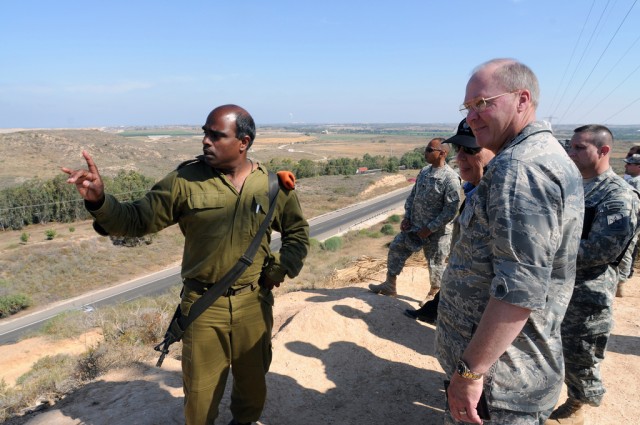
SDEROT, Israel (Army News Service, May 25, 2010) -- A four-year relationship between the National Guard and the Israeli Defense Force's Home Front Command is yielding valuable lessons for both sides.
The National Guard is on a quest to improve homeland defense in the United States. Circumstances have forced the IDF to be a world leader in homeland defense, as National Guard leaders saw firsthand during a visit to Sderot overlooking the Gaza Strip on Tuesday.
Meanwhile, the IDF seeks insights on issues such as border operations -- something the National Guard has more than two decades of experience.
"Our relationship with Israel is a critical one that is stronger than ever," Air Force Gen. Craig McKinley, the chief of the National Guard Bureau, said Tuesday as he toured Sderot's civil defense measures. "We greatly value this cooperation. Our exchange of ideas and information with the Home Front Command is of substantial benefit to the National Guard in exercising its responsibilities for homeland defense."
Although there are significant structural and legal differences, the IDF is broadly analogous to the Army and the HFC is analogous to the National Guard.
McKinley and other National Guard and Defense Department leaders, including Air Force Brig. Gen. Scott Schofield, the mobilization assistant to the commander of North American Aerospace Defense Command here representing U.S. Northern Command, are visiting Israel to further solidify the Guard's relationship with the IDF/HFC.
NORTHCOM plans, organizes and executes homeland defense and civil support missions. The National Guard is critical to NORTHCOM's mission, according to the combatant command's 2010 posture statement.
The IDF/HFC offers the Guard lessons beyond homeland defense.
"We commend the HFC for the outstanding performance of their National Search and Rescue Team in prompt response to the huge humanitarian emergency resulting from the devastating earthquake in Haiti earlier this year," McKinley said.
Among other contributions, the Israelis built a field hospital in eight hours in Haiti, treated hundreds of earthquake victims and stayed twice as long as originally planned for the relief mission - a mission the National Guard shares.
The National Guard leadership visit here comes as Israel undertakes National Level Exercise Turning Point 4.
Every Israeli citizen is expected to participate in the exercise, which includes a nationwide siren on Wednesday, when residents will conduct an evacuation drill.
The National Guard's relationship with the HFC is conducted within Defense Department policy guidelines and under U.S. European Command's security cooperation strategy for Israel.
On Monday and Tuesday, the National Guard delegation met with Maj. Gen. Yair Golan, HFC commander. McKinley announced the approval of the stationing of an HFC liaison officer at the National Guard Bureau beginning later this year.
In the past, National Guard liaison officers have been hosted by the HFC.
The partners have traded information about technologies, tactics, techniques and procedures to improve security, crisis response and consequence capabilities.
The delegation has also met with U.S. Ambassador James Cunningham and embassy personnel since its Monday arrival in Israel. The National Guard works closely with the State Department and Defense Department and the combatant commands in its foreign partnerships. These include formal State Partnership Program relationships between the 54 states and territories and the District of Columbia and 62 foreign countries.
Here in Sderot, homeland defense takes on a whole new meaning.
This city of about 20,000 in southern Israel less than a mile from the Gaza Strip has been the target of thousands of rocket attacks since 2000.
Like any city, Sderot has a town hall. Unlike most, it has a duplicate government facility in an underground bunker.
Concrete evacuation shelters sit beside every bus stop. Construction crews are adding shelters to homes built before Israel required that every residence have a shelter.
Residents are used to finding shelter within 15 seconds after siren warnings of impending attacks.
Now Israel is launching a national cell phone alert system to target emergency information about impending natural or manmade disasters to affected residents. The system alerts residents even if cell phones are in silent mode, taking over the cell phone system to prevent the kind of service outages experienced in the aftermath of events like Hurricane Katrina or the Sept. 11, 2001, terrorist attacks.
Leaders say a similar system could benefit the National Guard in its mission at home.

Social Sharing